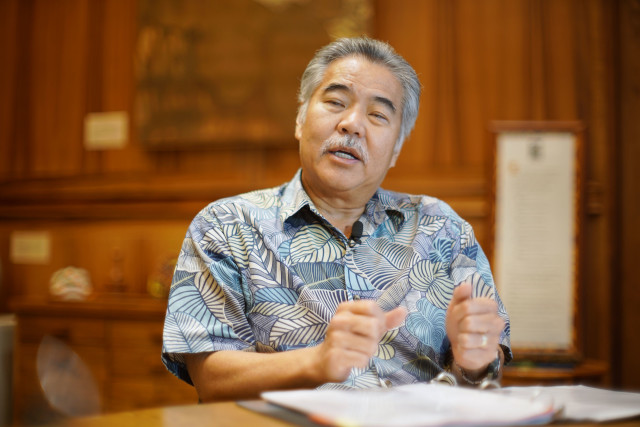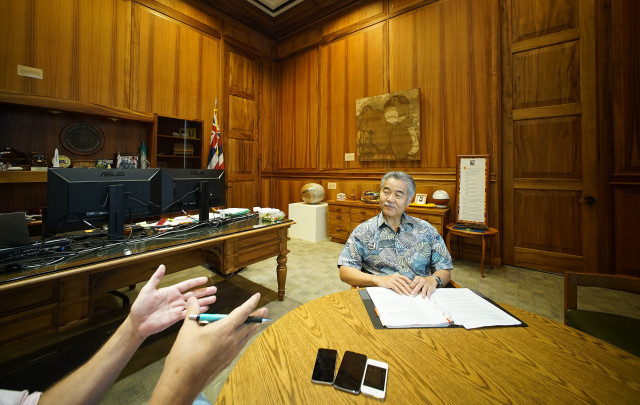Three months ago Gov. David Ige told attendees at an international conference on conservation that he would like to see Hawaii by the year 2020.
That would mean 20 percent of its food would be produced locally, significantly reducing its dependency on imports. The governor made the announcement at the  World Conservation Congress meeting in Honolulu.
At the same conference, Ige said he also wanted the state to commit to protect 30 percent of its highest priority watersheds by 2030 and to “effectively manage” 30 percent of its nearshore ocean waters in the same time frame.
Meanwhile, Hawaii has a goal of 100 percent renewable energy by the year 2045.
That’s a lot of goals.

Ige, now in his third year in office, said the objectives are intertwined and tied to other issues of importance to Hawaii. The governor said a holistic approach to sustainability is necessary.
“So, it is about food production, it is about managing the natural resources of our community, and in both instances it really is about collaboration with the community,” he said in an interview Thursday in his office.
“We are what we eat.” — Hawaii Gov. David Ige
That “community” includes small farmers and big agriculture companies, conservationists and agencies responsible for protecting the state’s natural resources. And, of course, it includes the 76 members of the Hawaii Legislature that must approve a budget and have their own spending priorities.
Ige’s first biennial budget will be unveiled Monday, his opportunity to chart the state’s fiscal course for the next two years.
He has been meeting with the media to dole out elements of his budget proposal. His interview with Civil Beat and media partner KITV was about food sustainability, for example. Just before that, he met with a reporter from another news organization to talk about housing.
The governor revealed no precise proposals or dollar figures. But he did say that one of the budget’s priorities is food sustainability.
Union Contracts Loom
One opportunity is to find a way to capitalize on recent acquisitions of prime agricultural lands, such as the Galbraith and Dole lands on Oahu.
Similarly, Ige is looking to Central Maui, where this week ended production but now promises to move toward diversified agriculture and cattle ranching. Old sugar lands can be used for biofuels, too.
There is also the need to protect island watersheds and to better manage shorelines and nearshore waters, Ige said. Fighting invasive species remains a concern, and the spread of rapid ohia death on Hawaii Island must be stopped, he said.

And the governor wants to see more production of fruits and vegetables (“We are what we eat,” he observed), which means helping farmers become price competitive. A tax break granted to organic farmers last session was a good start, he said.
Ige said Hawaii must consider how vulnerable it would be if a natural disaster shut down the state’s ports for an extended period. Being food sustainable, he suggested, could be a matter of survival.
It’s also about jobs.
“We send our hard-earned dollars out of state,” Ige said. “I want to invest in our communities and create jobs.”
With two strong bond ratings — “the highest we have ever had,” he said — the state is on solid financial ground to reduce long-term costs.
They include unfunded liabilities for health and pension plans for state workers and retirees, and contracts for 14 units of the state’s four public-sector unions that will have to be settled in the coming year.
“We send our hard-earned dollars out of state.” — Gov. David Ige
Ige said he knows that the budget he introduces will undergo significant changes once the Senate Ways and Means and House Finance committees get their hands on it. But he said he has a good relationship with the respective chairs, Sen. Jill Tokuda and Rep. Sylvia Luke.
“They do not agree 100 percent on every line item, but they agree on many things,” he said.
The main thing they agree on is keeping Hawaii’s fiscal house in order. And Ige said that, along with public health and safety, is his top priority, too.
In his view, growing more of our own food could go a long way toward ensuring both.
 GET IN-DEPTH
REPORTING ON HAWAII’S BIGGEST ISSUES
GET IN-DEPTH
REPORTING ON HAWAII’S BIGGEST ISSUES
We need your help.
Unfortunately, being named a finalist for a Pulitzer prize doesn’t make us immune to financial pressures. The fact is, our revenue hasn’t kept pace with our need to grow,Ěý.
Civil Beat is a nonprofit, reader-supported newsroom based in ±á˛ą·É˛ąľ±Ę»ľ±. We’re looking to build a more resilient, diverse and deeply impactful media landscape, and we hope you’ll help by .
About the Author
-
 Chad Blair is the politics editor for Civil Beat. You can reach him by email at cblair@civilbeat.org or follow him on X at .
Chad Blair is the politics editor for Civil Beat. You can reach him by email at cblair@civilbeat.org or follow him on X at .



